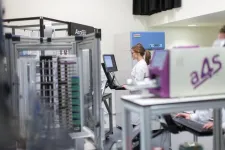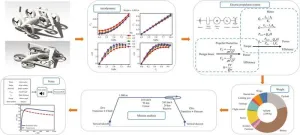(Press-News.org) Bezos Earth Fund grant establishes new Centre at Imperial to transform global food systems from environmentally damaging to innovative by creating sustainable solutions.
Imperial’s Bezos Centre for Sustainable Protein, launched today, will develop innovative and evidence-based solutions through the design, delivery, and commercialisation of alternative food products that are economically and environmentally friendly, nutritious, affordable, and tasty.
The Centre, spanning across seven Imperial academic departments, will advance research into precision fermentation, cultivated meat, bioprocessing and automation, nutrition, and AI and machine learning.
The Bezos Earth Fund is providing the funding as part of a $100 million commitment to developing sustainable protein alternatives and expanding consumer choice and an overall $1 billion commitment to food transformation. It’s one of multiple Earth Fund Centres working with other institutions and industry partners to develop and commercialise new alternative protein products to give consumers more choice for meat and dairy products.
Professor Hugh Brady, President of Imperial College London, said: “Food security is one of the biggest challenges facing humanity. For a sustainable future, we need to ensure that people across the world can be fed adequately and nutritiously with minimal impact on biodiversity, climate and our wider natural environment.
“Imperial has the leading-edge research, innovation, partnerships and convening power to advance global food systems and we are very excited by the potential of our new Bezos Centre for Sustainable Protein.”
Dr Andrew Steer, President and CEO of the Earth Fund said: “The Bezos Earth Fund is proud to support Imperial as the home of our second sustainable protein centre. By 2050 the world population will be over 10 billion, so now is the time to rethink the way we produce and consume food. This work will help ensure that our future includes more protein options – and that they taste great, are nutritious and come at low cost.”
Transforming our food system
Protein is essential to human health; without it our cells, tissues, and organs can’t function. Protein is gained through what we eat, including both animal and plant sources, such as meat, eggs, fish, nuts, and legumes like beans.
However, animal-based protein production requires extensive land use and generates significant greenhouse gas emissions. As the global population expands, the health of both humans and the planet will increasingly depend on widespread availability of proteins that taste good and are produced in ways that reduce emissions and protect nature.
Plant-based proteins are already gaining momentum as meat alternatives, such as in pea-protein-based burgers. In addition, new technologies are making new kinds of protein that also have the potential to fit this bill, including through microbial fermentation, which can produce proteins and nutrients that can be used in food formulations, and cultivated meat grown from animal cells.
Widespread acceptance and uptake of these alternative proteins relies on improvements in their quality and price, as well as reductions in cost and energy use. To transform these proteins into healthy and tasty food, other components also need to be produced more sustainably and efficiently, such as healthy fats and carbohydrates and aspects like flavour, aroma, colourants, and vitamins. This is where engineering biology comes in.
Accelerating development
Engineering biology applies engineering concepts to design, build and manufacture cells and products. The Centre will use a combination of rational and computational-guided engineering strategies with automation at biofoundries – where cells are turned into mini-factories producing useful products – to accelerate the development and scaling up of new bio-based processes.
It will also encompass institutes and facilities that will help translate discoveries into real-world applications, educate the next generation of bioengineers, and support commercialisation. These include the Centre for Synthetic Biology, established in 2009 as the first of its kind in Europe, SynbiCITE, the UK’s industrial translation centre for synthetic biology, and the Centre for Translational Nutrition & Food Research, which has partnerships with Quorn, Nestle, Unilever, and Waitrose, among others.
Director of the new Centre, Dr Rodrigo Ledesma-Amaro, from the Department of Bioengineering at Imperial, said: “The Centre’s ethos is that bio-engineered solutions can – and should – be both planet and people-positive. Imperial is uniquely positioned to harness the potential of engineering biology to accelerate the alt-protein revolution and transform global food systems.”
Dr Andy Jarvis, the Earth Fund’s Director of Future of Food, said: “Later is dangerously too late if we're to think about growing our world's protein sources. Imperial College London has led pioneering efforts in the field of Engineering Biology, perfectly positioning the university to advance sustainable protein options that will satisfy the growing global masses.”
International partners
The Centre’s hub will be based at Imperial, with three spokes in the UK and three abroad, with more than 65 international partners spanning cutting-edge research and innovation to commercialisation of new products.
The UK spokes are grouped under members of the Cellular Agriculture Manufacturing Hub at UCL and Aberystwyth University, the Food Centre at Reading University, and the Growing Kent & Medway consortium involving the National Institute of Agricultural Botany and the Universities of Kent and Greenwich.
International spokes are hosted by the Technical University of Denmark (Biosustain), Tufts University (Centre for Cellular Agriculture), and the National University of Singapore.
The launch of the Bezos Centre for Sustainable Protein at Imperial follows the announcement of a sister centre last month at North Carolina State University, as part of the Bezos Earth Fund’s commitment to help transform food and agricultural systems, which also includes efforts to reduce livestock emissions.
END
Bezos Center for Sustainable Protein launches at Imperial with $30M funding
2024-06-24
ELSE PRESS RELEASES FROM THIS DATE:
Star clusters observed within a galaxy in the early Universe for the first time
2024-06-24
The history of how stars and galaxies came to be and evolved into the present day remains among the most challenging astrophysical questions to solve yet, but new research brings us closer to understanding it.
In a new study by an international team led by Dr. Angela Adamo at Stockholm University, new insights about young galaxies during the Epoch of Reionization have been revealed. Observations with the James Webb Space Telescope (JWST) of the galaxy Cosmic Gems arc (SPT0615-JD) have confirmed that the light of the galaxy was emitted 460 million years after ...
How much oxygen do very premature babies need after birth?
2024-06-24
Giving very premature babies high concentrations of oxygen soon after birth may reduce the risk of death by 50 percent, compared to lower levels of oxygen says new research led by University of Sydney researchers.
When premature babies are born, they sometimes need help breathing because their lungs haven’t finished developing. To help babies during this process, doctors may give them extra oxygen through a breathing mask or breathing tube.
The study, published in JAMA Pediatrics, examined clinical trial data and outcomes of ...
Trial offers hope for cheaper, more tolerable, ketamine treatment
2024-06-24
For those suffering from treatment-resistant depression, the anaesthetic drug ketamine offers hope, but it has side effects and can be costly to access – a University of Otago-led clinical trial may change that.
Working in collaboration with New Zealand’s Douglas Pharmaceuticals, researchers have conducted a trial of ketamine in an extended-release tablet form.
The study, published in prestigious international journal Nature Medicine, involved 168 adults for whom regular anti-depressant therapy ...
Fertility treatments could get boost from stem cells
2024-06-24
An unexpectedly versatile and regenerative stem cell in early embryos may be key to creating new effective fertility treatments, suggests a new study in mice from the University of Copenhagen.
It probably will not surprise anyone that pregnancy is a very complicated process. First, a sperm cell must find its way and fertilize an egg in the fallopian tube, after which the egg begins to divide. After about five days, the egg becomes a blastocyst, which eventually develops into a fetus.
But for more and more people, fertility is becoming increasingly harder to achieve due to various factors ...
Ketamine slow-release tablet reduces symptoms of severe depression: Clinical trial
2024-06-24
A new tablet form of ketamine has shown promise in treating severe depression, offering a potential alternative to existing clinic-based treatments that can be expensive and lacking in convenience for some patients.
Unlike the injectable and nasal spray alternatives that require clinicians to monitor patients for two hours while side effects subside, the slow-release tablet form can be taken safely at home without medical supervision and with negligible side effects.
Led by Professor Paul Glue of University of Otago, researchers from UNSW Sydney and the affiliated Black Dog Institute (BDI) collaborated with colleagues from ...
The future takes flight: Autonomous eVTOLs transforming air mobility
2024-06-24
In recent years, a new era of transportation innovation has unfolded with the introduction of autonomous electric vertical take-off and landing (eVTOL) aircrafts. These advanced air mobility (AAM) systems are poised to revolutionize urban and regional transportation by offering efficient, sustainable, and rapid transit solutions, potentially transforming daily commutes and cargo deliveries alike.
eVTOL technology, which enables aircrafts to ascend, hover, and land vertically, has become a focus for both academic research and commercial ventures due to its numerous advantages ...
One bad apple spoils the barrel: New study uncovers multiple molecular subgroups in liver cancer with most aggressive driving clinical outcomes
2024-06-24
Singapore, 24 June 2024 – A study led by clinician-scientists and scientists from the National Cancer Centre Singapore (NCCS) and A*STAR’s Genome Institute of Singapore (GIS) and funded by the National Research Foundation Singapore (NRF) has discovered unexpected molecular heterogeneity even within the same liver tumours. More than 40% of HCC harbours more than one molecular subtype within the same tumour and in these, the clinical outcomes for the patients are best predicted by the most aggressive subtype. This phenomenon, termed the “bad apple effect”, has significant implications on the understanding of liver cancer and suggests that a more holistic sampling ...
Rising health care prices are driving unemployment and job losses
2024-06-24
New Haven, Conn. — Rising health care prices in the U.S. are leading employers outside the health care sector to reduce their payroll and decrease their number of employees, according to a new study co-authored by Yale economist Zack Cooper.
The study, published June 24 as a working paper by the National Bureau of Economic Research (NBER), found that when health care prices increased, non-health care employers responded by reducing their payroll and cutting the jobs of middle-class workers. For the average county, a 1% increase in health ...
NUTRITION 2024 press materials available now
2024-06-24
Press materials are now available for NUTRITION 2024, the annual flagship meeting of the American Society for Nutrition (ASN). Top nutrition scientists and practitioners from around the world will gather to share the latest research findings on food and nutrition during the meeting, held in Chicago from June 29–July 2.
Register for a press pass to attend NUTRITION 2024 in person or to access embargoed press materials before the meeting. Explore the meeting schedule, poster presentations, poster theater flash sessions and oral presentations to see all the exciting research ...
Study Shows Stricter Alcohol Policies Are Associated with Reduction in Homicides
2024-06-24
Ann Arbor, June 24, 2024 – Alcohol consumption is involved in a large proportion of homicides and suicides each year in the United States, but there has been limited evidence on how policies targeting alcohol use influence violence. A statistical analysis in the American Journal of Preventive Medicine, published by Elsevier, indicates that more restrictive alcohol policy environments are associated with a reduction in specific states’ homicide rates.
Lead investigator James P. Murphy, PhD, RAND Corporation, Santa Monica, CA, says, "Previous studies have found a significant relationship between some state-level ...



